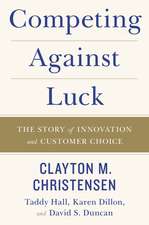Corporate Sustainability Management in the Energy Sector: An Empirical Contigency Approach
Autor Oliver Salzmannen Limba Engleză Paperback – 12 sep 2008
Preț: 389.49 lei
Nou
Puncte Express: 584
Preț estimativ în valută:
74.53€ • 76.89$ • 62.19£
74.53€ • 76.89$ • 62.19£
Carte tipărită la comandă
Livrare economică 26 martie-09 aprilie
Preluare comenzi: 021 569.72.76
Specificații
ISBN-13: 9783834908544
ISBN-10: 3834908541
Pagini: 355
Ilustrații: XX, 355 p.
Dimensiuni: 148 x 210 x 21 mm
Greutate: 0.45 kg
Ediția:2008
Editura: Gabler Verlag
Colecția Gabler Verlag
Locul publicării:Wiesbaden, Germany
ISBN-10: 3834908541
Pagini: 355
Ilustrații: XX, 355 p.
Dimensiuni: 148 x 210 x 21 mm
Greutate: 0.45 kg
Ediția:2008
Editura: Gabler Verlag
Colecția Gabler Verlag
Locul publicării:Wiesbaden, Germany
Public țintă
ResearchCuprins
Theoretical foundation and concepts.- Review of empirical literature.- Conceptual rationale and research questions.- Method.- Sector characteristics.- Data collected.- Empirical evidence.- Synopsis.
Notă biografică
Dr. Oliver Salzmann promovierte bei Prof. Dr. Ulrich Steger am Institut für Technologie und Management der TU Berlin. Er war zu dieser Zeit als Research Associate am IMD in Lausanne tätig. Zurzeit arbeitet er als Vertriebsingenieur in der Solarbranche.
Textul de pe ultima copertă
Corporate social responsibility, sustainability, and citizenship are terms that often evoke considerable scepticism and cynicism, particularly in civil society. Much needed sector-specific and comparative research, which could facilitate a more fact-oriented debate, is still missing from the literature. The present study aims to fill this gap by presenting data collected from two groups of managers, namely sustainability experts and non-sustainability experts, from two different industry sectors (integrated oil and gas vs. electric utilities) and several geographical regions.
Oliver Salzmann provides a comprehensive view on corporate sustainability management in companies such as Shell and RWE and investigates the key social and environmental issues driving the energy sector. The author analyses the influence which stakeholder pressure exercises on energy companies and their efforts to become more responsive. Moreover, he develops a model for strategic, thus profit-oriented, corporate sustainability management.
Oliver Salzmann provides a comprehensive view on corporate sustainability management in companies such as Shell and RWE and investigates the key social and environmental issues driving the energy sector. The author analyses the influence which stakeholder pressure exercises on energy companies and their efforts to become more responsive. Moreover, he develops a model for strategic, thus profit-oriented, corporate sustainability management.











